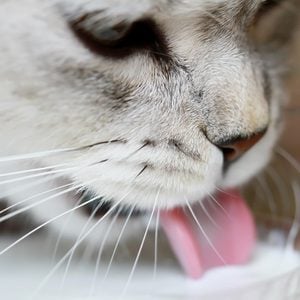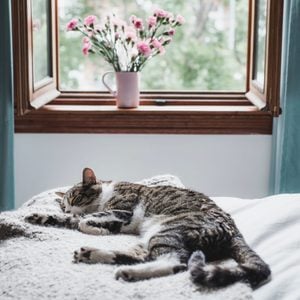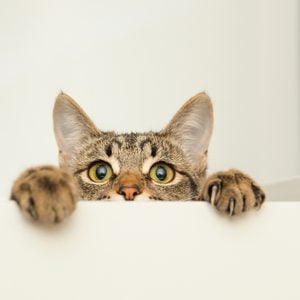Why Do Cats Eat Grass?
Updated: Jul. 20, 2023
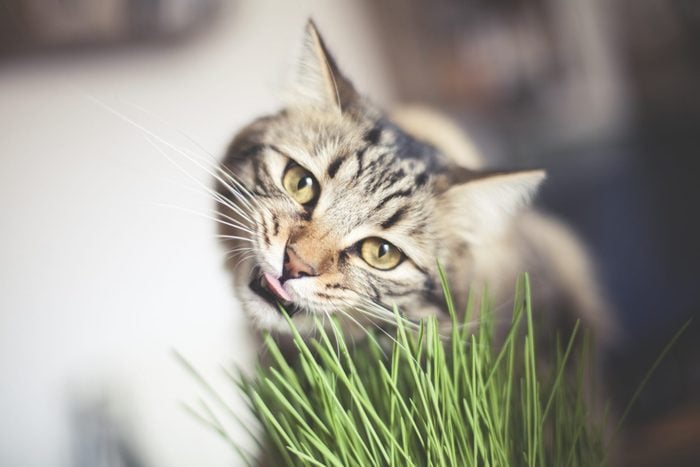
It's usually not a big deal for your cat to nibble on grass, but if they're doing it excessively, you may want to call the vet
Cats are full of contradictions. They’re aloof yet goofy, cuddly yet standoffish, and all kitty parents know that figuring out cat behavior means a lifetime of learning. Even if you already know the answer to why cats wag their tails and why cats purr, and you’re clear on why cats knead (because they’re making biscuits, of course), there are other things cats do that are pretty much a mystery. Why do cats sleep so much? Why do they decide 3 a.m. is a good time to run an obstacle course in your home? And why do cats eat grass? Here, cat experts help us get to the root of that last one.
Get Reader’s Digest’s Read Up newsletter for pet insights, humor, cleaning, travel, tech and fun facts all week long.
Why do cats eat grass?
Although there isn’t a lot of specific research on why cats eat grass, there are a few reasons you might notice this behavior in your cat, according to Pete Lands, DVM, chief medical officer and managing partner at Washington Ave Animal Hospital in Philadelphia.
It helps their digestive system
Turns out, cats commonly have a number of underlying gastrointestinal diseases, such as irritable bowel syndrome. So chewing grass may be a way for them to calm down their GI tract, either to help move things along a little bit faster or help them vomit up hairballs, explains Dr. Lands. That’s why you might see your cat vomiting after eating grass!
It relieves constipation
Grass has plenty of fiber, which can help with constipation. “Cats are notoriously poor water drinkers, and sometimes adding fiber to the diet just helps them poop a little bit easier,” says Angie Krause, DVM, CVA, CCRT, a holistic veterinarian based in Boulder, Colorado.
It adds nutrients to their diet
It might also be worth looking into what you’re feeding that feline. Some cats eat grass to make up for nutritional deficiencies in their diet, such as folic acid, which helps form hemoglobin.
“If the diet they have at home is devoid of certain vitamins, minerals or nutrients, they may be trying to find those elsewhere,” says Dr. Lands. “So one place they may be able to find folic acid would be by eating grass, if that was something their diet might be missing.”
Better start reading those labels! You wouldn’t want to make these dangerous mistakes as a cat owner.
It gives them an outlet for stress
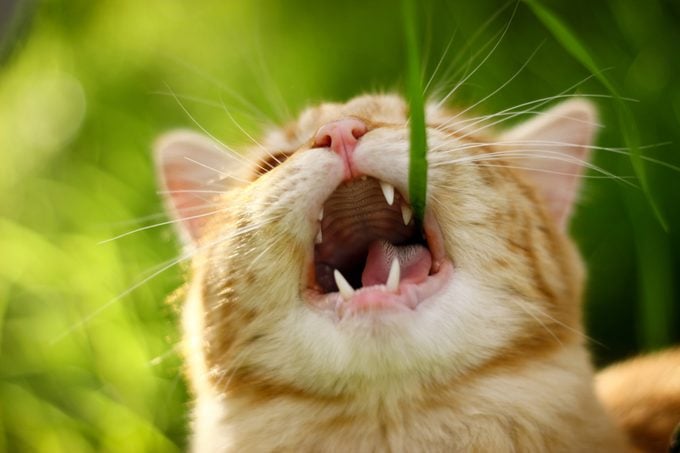
That said, eating grass may also be a sign that your kitty is stressed out. “Some people say if a cat is in a stressful environment, they may stress eat, similar to the way humans stress or emotionally eat to kind of help relax them or calm them down,” says Dr. Lands. We prefer brownies when we’re under stress, but if your cat is chowing down on your land, check that you’re avoiding these things you do that your cat secretly hates.
Is it good for cats to eat grass?
Eating a bit of grass now and then isn’t a big deal, but too much could result in medical complications. “In America, most of our cats are indoors all year, so if they’re going outside and eating grass, you should probably get on the phone and talk to your vet,” says Dr. Lands. In some cases, if a cat eats too much grass, it can get stuck in the stomach and require surgery to remove. A visit to the vet will help identify any underlying conditions that could be causing your cat to eat grass. Some cats may also enjoy the taste of other pet food–so we asked experts if it’s safe for cats to eat dog food.
However, some cats just like the taste of grass, and in small amounts, it can provide valuable fiber for kitties with sensitive stomachs. Dr. Krause has a cat with GI issues, and she grows cat grass for her cat to eat. “He’s the one who will eat grass until he vomits, no matter what kind of grass,” Krause says. “And so with him, when I grow grass for him, I watch how much is available to him, because he’ll just mow [it] down if I grow a ton.”
Should you stop cats from eating grass?
We asked Celia Haddon, a cat behaviorist and author of Being Your Cat: What’s Really Going On in Your Feline’s Mind, this common cat question. She says you shouldn’t stop cats from eating grass, as it’s a natural instinct and it’s good for their welfare. In fact, she recommends that owners of indoor cats provide a grass garden for their furry friends. “Cats seem to enjoy eating grass, so a grass garden indoors helps indoor cats avoid boredom by giving them something to do.” It can also deter them from chewing on houseplants that could be toxic to them.
While this natural snacking instinct isn’t typically a cause for concern, keep these tips in mind if your cat is eating grass:
- Avoid using fertilizer and pesticides on your grass. If you need to use fertilizer, make sure it’s pet-friendly.
- Don’t keep plants that are toxic to cats in your house and yard—if they like eating grass, they may nibble on plants as well.
- Keep an eye on how often they get sick after eating grass. “If your cat frequently vomits after eating grass, it may well be a sign of some kind of digestive problem,” Haddon explains. “Have a talk with your veterinarian about changing its diet.”
Meet the experts
- Pete Lands, DVM, is the chief medical officer and managing partner at Washington Ave Animal Hospital in Philadelphia. He’s also a pet parent of two dogs, Rambo and Rosie.
- Angie Krause, DVM, CVA, CCRT, is a holistic veterinarian in Boulder, Colorado. Her practice combines traditional and alternative therapies to help pets lead happy and healthy lives.
- Celia Haddon is a cat behaviorist and the author of Being Your Cat: What’s Really Going On in Your Feline’s Mind. She holds a bachelor’s degree in applied animal behavior and a master’s degree in clinical animal behavior. She also served as the pets columnist for The Daily Telegraph for 20 years, answering an estimated 100,000 questions on animal behavior.
Additional reporting by Kelly Kuehn.
